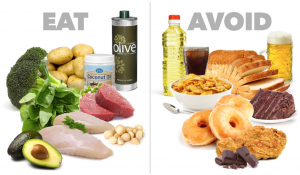
People are always making comments about staying away from fat in order to not get fat. That couldn’t be further from the truth. Fat does NOT make you fat. Fat should be your friend. In fact, 25 to 30 percent of your daily calories should come from fat. But, not all fat is good for you. You should pick good fats, and limit the bad kinds of fat. A recent Harvard study found that eating good fats will help you live longer, and will help reverse the negative impacts of unhealthy saturated and trans fats.
My advice to you is: if you want to lose weight -and live longer- then eat good fat at every meal. It digests slowly. This means you’ll feel satisfied for a longer period of time, and you’ll eat less overall. But before you start eating fat, educate yourself on what kind of fats you will be eating.
There are three types of fat: unsaturated fats, saturated fats and trans fats. You have to know what foods contain what types of fat in order to make wise eating decisions.
Unsaturated fats: Unsaturated fats are good fats. Unsaturated fats can either be monounsaturated or polyunsaturated.
Monounsaturated fats raise good HDL cholesterol, lower bad LDL cholesterol, and protect against the buildup of plaque in your arteries. Research also shows, they prevent belly fat. You’ll find these fats in olive oil, olives, canola oil, almonds, cashews, peanuts, peanut butter, sesame seeds and avocados.
Polyunsaturated fats, in addition to lowering your LDL, contain essential omega-3 fatty acids. Omega-3’s will also boost brain function and will strengthen your immune system. In addition, research shows that these fats can improve your mood. You must be careful because these types of fats can also contain omega-6 fatty acids, which in small amounts can keep skin and eyes healthy. You will find Omega-3’s in fish like salmon, herring, mackerel, as well as canola oil, flaxseed, and walnuts. Omega-6s are in corn, safflower oil, corn-fed check and beef, and farmed fish. You need to limit – as opposed to eliminate – foods with Omega-6 oils. In larger doses, Omega-6 oils can lead to inflammation, which is linked to heart disease. The conclusion of this paragraph is trade vegetable oils for olive and canola oils, and eat grass-fed beef and wild-caught fish. See my Saturday post on grass-fed beef versus grain fed-beef.
Saturated Fats: Saturated fats are bad fats because they raise cholesterol levels and increase your risk of heart disease. You’ll find these fats in meat, poultry, cream, butter and whole milk. In addition, you can find these fats in coconut and palm oil. You should limit saturated fats to less than 10% of your daily calories. It’s easy to limit these fats: just remove any hard fat you can see on meat and poultry.
Trans Fats: Trans Fats, unlike the two other types of fats, should be avoided totally. These fats are chemically altered unsaturated fats. These fats are used to prolong the shelf life of packaged goods. These fats will raise bad LDL and lower good HDL, increasing inflammation throughout the body.
You will find these fats in shortening, margarine, doughnuts, processed French fires, and processed foods such as crackers, cookies, chips and cakes. To find trans fats look for the words “partially hydrogenated vegetable oil” on the ingredients list.
It’s hard to avoid these fats totally because the FDA allows manufacturers to claim a product contains “zero trans fats” if one serving has less than .5grams of trans fats or less. So eat wisely and avoid processed foods.
Healthy ways to get fat and avoid over eating, start a meals with eating 1 oz of almonds, ¼ cup walnuts, ¼-½ avocado, 1–2 tablespoons of almond butter, 8 olives (green or black), or sunflower seeds (1/4 cup). These foods will help you feel satisfied and will help you not overeat, especially, when you’re famished.
